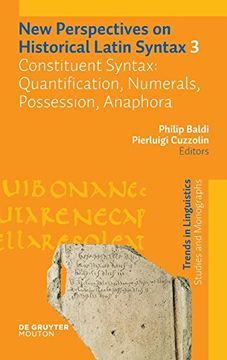Share
Constituent Syntax: Quantification, Numerals, Possession, Anaphora (Trends in Linguistics: Studies and Monographs)
Philip (Edt) Baldi (Author)
·
De Gruyter Mouton
· Hardcover
Constituent Syntax: Quantification, Numerals, Possession, Anaphora (Trends in Linguistics: Studies and Monographs) - philip (edt) baldi
Choose the list to add your product or create one New List
✓ Product added successfully to the Wishlist.
Go to My Wishlists
Origin: U.S.A.
(Import costs included in the price)
It will be shipped from our warehouse between
Friday, July 19 and
Friday, July 26.
You will receive it anywhere in United Kingdom between 1 and 3 business days after shipment.
Synopsis "Constituent Syntax: Quantification, Numerals, Possession, Anaphora (Trends in Linguistics: Studies and Monographs)"
New Perspectives on Historical Latin Syntax: Constituent Syntax (Quantification, Numerals, Possession, Anaphora) is the third of four volumes dealing with the long-term evolution of Latin syntax, roughly from the 4th century BCE up to the 6th century CE. Essentially an extension of Volume 2, Volume 3 concentrates on additional subsentential syntactic phenomena and their long-term evolution from the earliest texts up to the Late Latin period. Included in Volume 3 are detailed treatments of quantification, numerals, possession, and deixis/anaphora. As in the other volumes, the non-technical style and extensive illustration with classical examples makes the content readable and immediately useful to the widest audience. Key features first publication to investigates the long-term syntactic history of Latin generally accessible to linguists and non-linguists theoretically coherent, formulated in functional-typological terms does not require reading fluency in Latin, since all examples are translated into English

